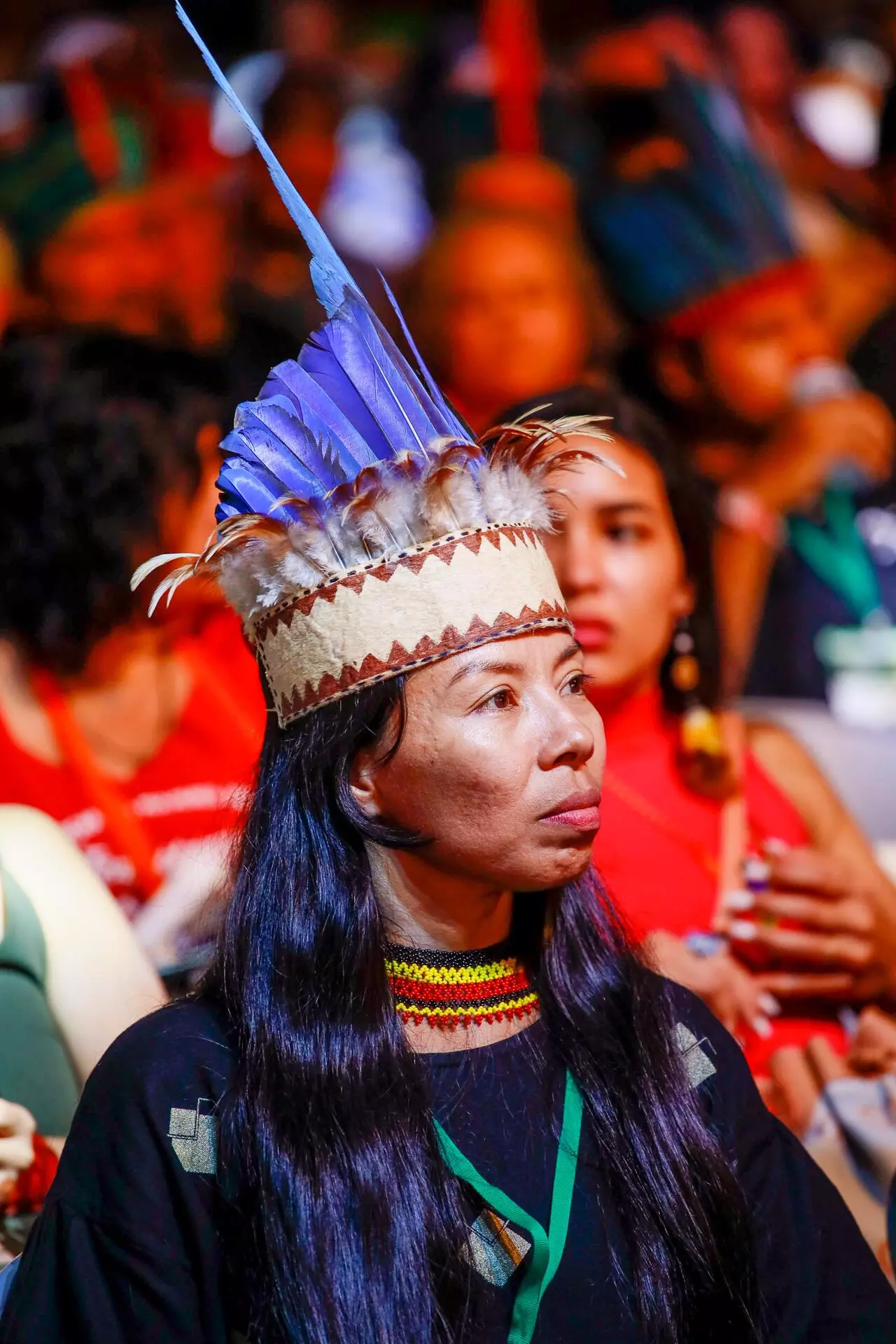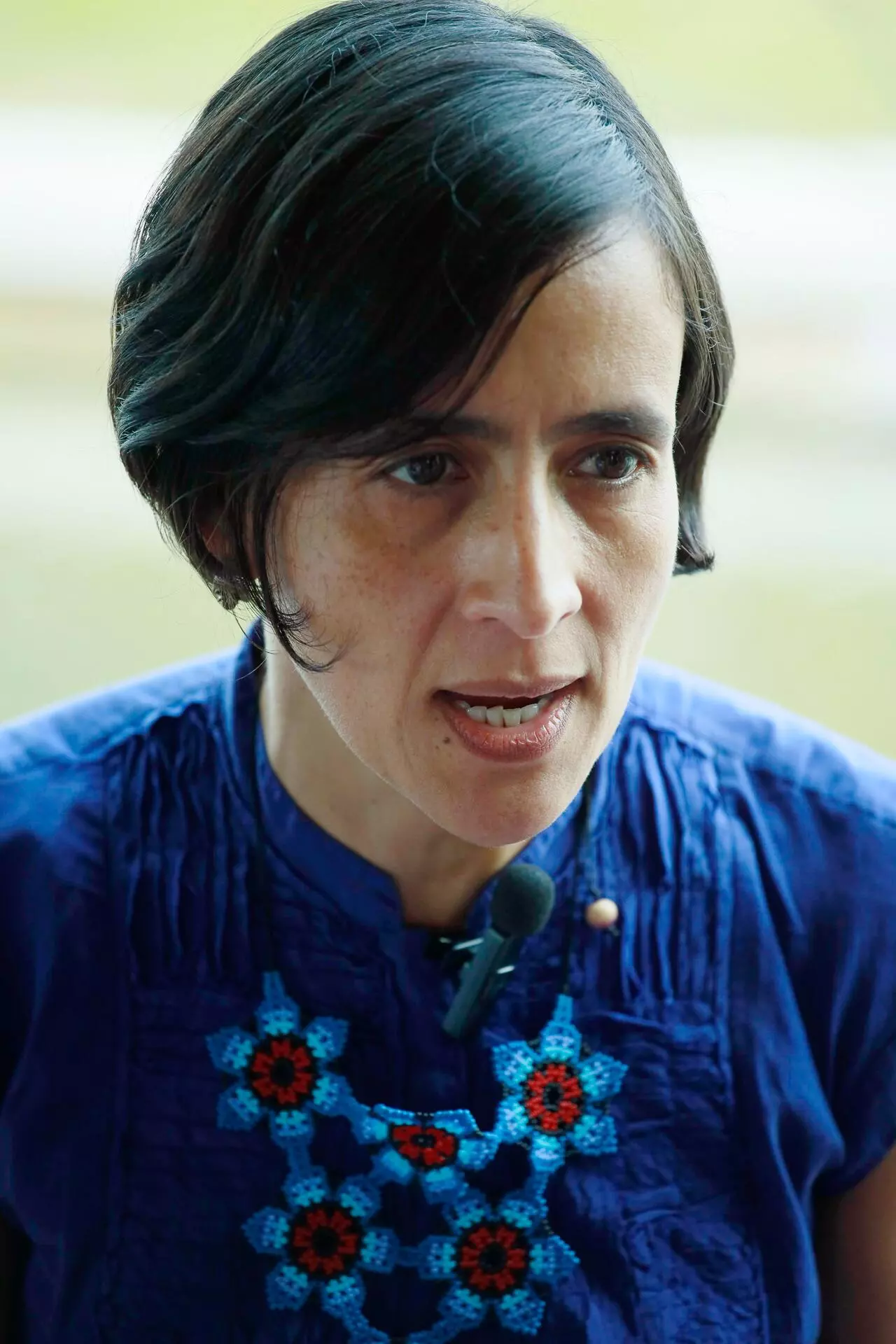When they came to Belém in early August for the summit of eight Amazonian countries, the leaders of the region’s social and activist movements already knew the agreement reached by their governments would fall short of their demands. They arrived there after a fourteen-year hiatus from official meetings like this and in the context of a forest that is alarmingly close to the point of no return. They knew there was no consensus among the heads of state who make up the Amazon Cooperation Treaty Organization (ACTO) regarding the goal of zero deforestation by 2030, a commitment already undertaken by Brazil and Colombia. And there was even less consensus on a proposal from Colombia’s president, Gustavo Petro, to block new contracts for oil and gas exploration in the Amazon biome, a topic that is dividing Brazil’s government. For all of these reasons, it was imperative for them to ensure the meeting of forest peoples, called the Amazon Dialogs, would reverberate sufficiently for their message to reach government leaders. If they were unable to move intentions forward toward a concrete plan, they at least wanted to prevent backsliding.
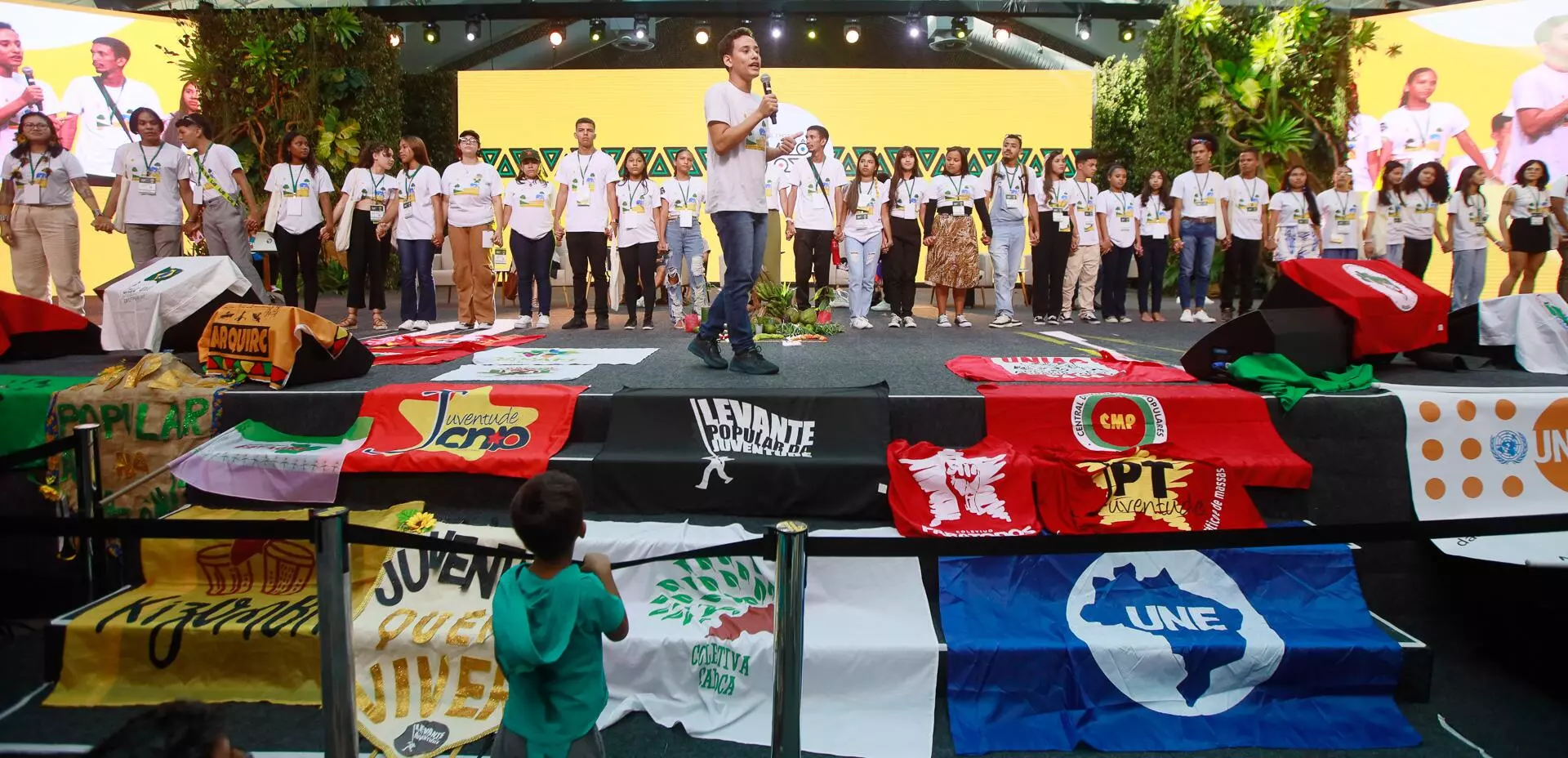
Flags on stage: at the Dialogues, social movements and organizations have embarked on a journey that they hope can advance toward 2025, when Pará’s state capital will host the COP-30. Photo: Carlos Borges/SUMAÚA
Knowing that within Brazil’s government a pressing need to halt the ecological and human catastrophe coexists alongside those defending predatory agribusiness and fossil fuels, these social movements and non-governmental organizations have embarked on a journey that they hope can advance toward 2025, when Pará’s state capital will host the 30th United Nations Climate Change Conference, the COP-30. These two years are seen as a window to try to bring the Amazon towards a new model that spares the forest from destruction.
The story of how the movements were able to put their ambitious proposals at the forefront of discussions in Belém reveals a close relationship, yet one filled with contradictions, with the Workers’ Party, now occupying the presidential palace for the fifth time – Luiz Inácio Lula da Silva is in his third term, while Dilma Rousseff served two terms.
The networks articulating social movements in Amazonian countries were coming out of a period of resumed activities following the pandemic and the Bolsonaro administration. In November 2022, before taking office, Lula announced that he would call the summit to discuss development “with social inclusion and climate responsibility.” Months earlier, in a show of support for Brazilian organizations’ resistance to the anti-forest and anti-Indigenous policies of the extreme right Jair Bolsonaro administration, the Pan-Amazonian Social Forum, the Global Assembly for the Amazon, and the Pan-Amazonian Ecclesial Network had held the forum’s first in-person meeting since 2017 in Belém, in July.
The coordinators of these networks wrote an open letter in which they called on governments to listen directly to the voices of local populations. “Each made their own efforts” to reach this goal, says Father Dario Bossi, an adviser to the Pan-Amazonian Ecclesial Network and to the Commission for the Socio-Transformative Action of the National Conference of Bishops of Brazil. The Lula administration first heard of the idea on March 2 of this year, at a breakfast in Brasília organized by José Valdeci Santos Mendes, the Bishop of Brejo, Maranhão, who also chairs the Commission. There, Father Dario Bossi spoke with Márcio Macêdo, the head of the President’s General Secretarial Office. “We started to talk about the summit, and he thought that we should hold dialogs on the Amazon with civil society organizations,” Macêdo recalls.
The talk resulted in the creation of a commission with representatives from government ministries and social organizations, including Indigenous and landless peoples, as well as the Amazon Working Group, which gathers around 600 associations in the region. At first, the idea was to hold five thematic plenary sessions on the days leading up to the summit, scheduled for August 8 and 9, to discuss everything from the energy transition to the situation of Indigenous peoples. Around 500 people were expected to attend. But there was much more demand to participate, with civil society alone organizing 405 debates. The structure had to be expanded to occupy the entire Hangar Convention Center, a space covering 24,000 square meters, the size of nearly three football fields. Debates were also held in other venues, like on the campus of the Federal University of Pará. In the end, 27,000 accredited attendees visited the Amazon Dialogs from August 4 to 6.
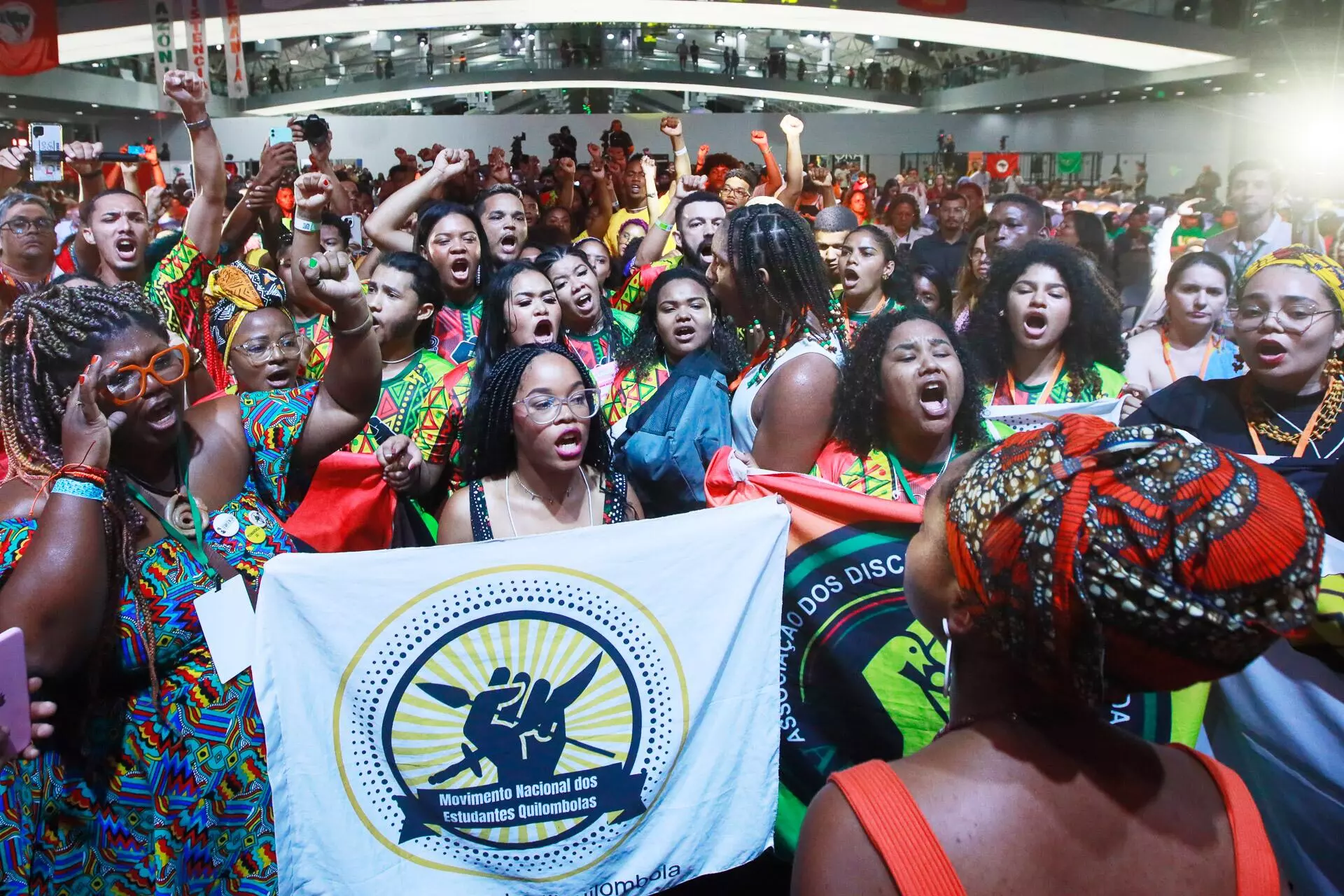
Quilombola students and indigenous youth had a strong presence during the Amazon Dialogues. Photo: Carlos Borges/SUMAÚMA
The ground of the forest moves
The Brazilian government provided no funding for those living in the forest to travel to Belém. Their trip was organized by the base. These interventions in the Dialogs led to an urgency incongruent with the time taken for political and economic bargaining. They talked about the continued harassment of human rights defenders, about people in settlements, about extractivists, and about Indigenous peoples whose lands are systematically stolen and invaded. “Look at us and tell us whether you all can sleep knowing that you’re killing us,” said Concita Guaxipiguara Sampré, an Indigenous teacher in Bom Jesus do Tocantins, Pará, and an adviser to the Gavião Kyikatêjê Association.
The Health and Happiness Project, which has worked with the traditional forest community of ribeirinhos living on the Tapajós River, sponsored trips of 100 residents from the region. Organizations supporting original peoples brought in around 1,000 leaders. Vanda Witoto, a nurse, educator and Indigenous leader based in Manaus, said sixty of her relatives from different territories traveled on their own dime to Belém, coming from the Solimões and Juruá Rivers.
Panh Ô Kayapó, the leader of the Baú village, near Novo Progresso, in southern Pará, traveled nearly 700 kilometers by bus to Santarém before taking an airplane to Belém, where she attended a meeting organized by Brazil’s Federal Prosecutor’s Office on the Indigenous and traditional community rights in negotiations with companies developing carbon credit projects.
Coordinator Edmilson Oliveira and vice coordinator Claudia Renata Lod from the Council of Oiapoque Caciques were also there to talk about how fungi are killing cassava plants in advance of this year’s harvest in Indigenous territories. They celebrated an agreement by Petrobras, mediated by the Federal Prosecutor’s Office, to start a formal consultation process on drilling in the Foz do Amazonas basin.
Francineide Ferreira dos Santos, a member of the ribeirinho community in Altamira, was also there. Taking the main stage, before Marina Silva, the head of the Environment and Climate Change Department, she spoke about the “great debt the Workers’ Party administration has with the people of the Xingu River,” following construction of the Belo Monte hydroelectric plant. “The fishers were expelled from the river, thrown into concrete settlements. Many are unable to pay their power bills, they are sick, they have no access to clean water, and they are being threatened for ‘talking too much,’” Francineide reported.
Also in attendance was Manoel Cunha, from the São Raimundo community in southeast Amazonas, a veteran of the rubber-tapper struggles and the manager of the Médio Juruá Extractive Reserve. With its 578 families, income from the management of pirarucu fish is allowing them to install solar power. Manoel took part in four debates at the Dialogs, where he spoke about rubber, açaí, and andiroba oil production. “They were already calling it a green economy and now they call it a sociobioeconomy,” which he sees as a better name, “because people have to come first,” he says.
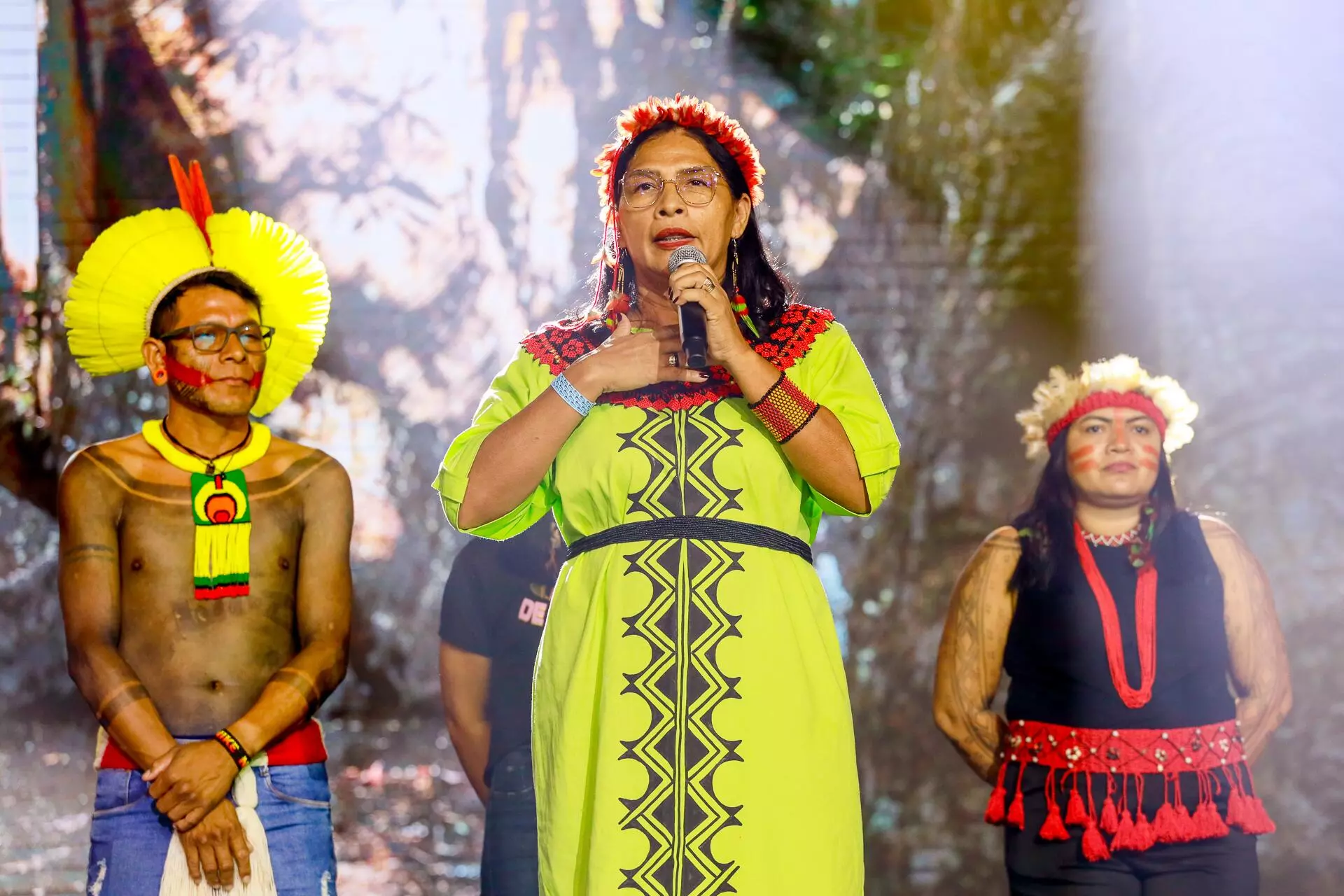
‘Look at us and tell us whether you all can sleep knowing that you’re killing us,’ said Concita Guaxipiguara Sampré, a teacher, talking about about Indigenous peoples whose lands are systematically stolen and invaded. Foto: Carlos Borges/SUMAÚMA
Not everything was under control
The Belém Declaration, announced on August 8 by the governments of Brazil, Bolivia, Colombia, Ecuador, Guyana, Peru, Suriname and Venezuela, had been under negotiation by these countries’ diplomats for weeks, without any direct participation from society. It was prepared days in advance, as is typical for these types of meetings. The declaration fell far short of the demands being made by social movements regarding oil, mining, and concrete forest conservation goals – despite environmentalist NGOs cheering the four times mention was made of preventing the biome from reaching the point of no return, as the moment is called when the forest loses its ability to regenerate and is therefore incapable of either regulating the climate or absorbing carbon from the atmosphere.
Everyone knew that Bolivia had resisted committing to a goal of zero deforestation by 2030, and that Colombia’s President Gustavo Petro stood alone in his proposal to make the Amazon fossil fuel-free. The only last-minute concession made to Colombia was a promise to “start a dialog” between the countries “on the sustainability of sectors such as mining and hydrocarbons” in the region.
Petro acted as a sort of conscience when he gave a speech denouncing the submission of politics to the “interests of fossil capital” and criticized the “progressive denialism” that postpones vital decisions to contain the planet’s rising temperature in the name of “national development.” Susana Muhamad, the head of Colombia’s Environment Department, explained that ending dependency on fossil fuels in her country is not only environmentally urgent, but is economically imperative, since coal and oil currently make up 40% of Colombia’s exports. “When the world starts to make the transition, markets will close, and we will fall into an economic void if we have no alternatives. That’s why it’s more important for investments to be able to go to the transition and not to exploration.”
Beyond Petro’s position, two other factors contributed to putting oil front and center at the debates that will continue up to the COP-30. One was mobilization by Ecuadorian organizations to hold a referendum, which on August 20, twelve days after the summit, passed with 59% of voters choosing to end oil production in Yasuní National Park, in the Amazon. The other was the mobilization of Brazil’s civil society against a Petrobras project to open a new frontier of exploration in the Foz do Amazonas basin.
The letter approved by the social movements demanded countries “stop promoting new research and exploration in the Amazon” and dedicate themselves to a “fair, popular, and inclusive energy transition plan, with reparations for affected peoples and territories.” Another letter, signed by Indigenous organizations from six of the eight nations, asked for “oil exploration exclusion zones,” including Yasuní and the Foz do Amazonas region.
“Lula says that, if done carefully, oil exploration can happen in the Amazon, but there are other ways for us to work on strengthening the economy and populations,” says Kleber Karipuna, the executive coordinator of the Alliance of Indigenous Peoples of Brazil (Apib). “The environmental impacts of oil are bigger than the economic benefits,” Bolivia’s Pablo Solón, with the Global Assembly for the Amazon, insisted to the presidents gathered there.
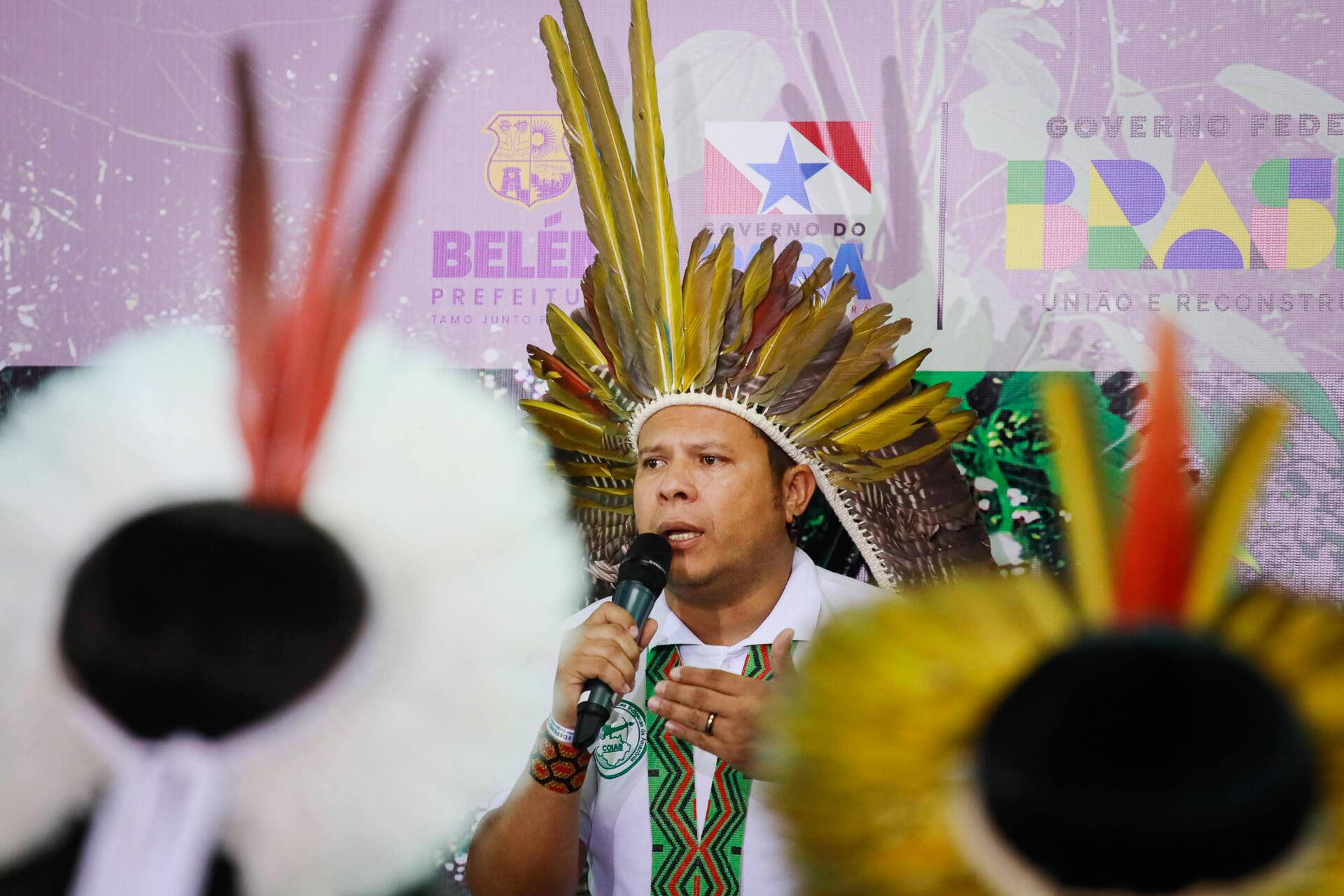
Kleber Karipuna, from the Articulation of Indigenous Peoples of Brazil, criticised Lula for saying that it is still possible to extract oil in the Amazon. ‘The environmental impacts are bigger than the economic benefits’. Photo: Carlos Borges/SUMAÚMA
Social control of mining and food security
Other key demands from social movements became clear. For instance, they asked for greater social control over the opening of new mines by large mining companies and for tax breaks on exploration to be abolished. Representatives from the Movement for Popular Sovereignty in Mining advocated a 10% increase in the royalties paid by industry – the rate of Financial Compensation for Mineral Resource Exploration applicable to gross sales revenues currently ranges from 1% for materials used in civil construction (rock, sand, gravel) to 3.5% for iron, with a rate of 1.5% applied to gold. “What reaches municipalities today is used neither on projects to benefit society nor to create alternatives to this activity,” says Charles Trocate, one of this movement’s members. The Belém Declaration promises to fight illegal mining along with the use of mercury in this activity, but it makes no reference to civil society demands related to industrial mining, which has a huge impact on the environment and the forest peoples.
Food security was another issue discussed in part in the declaration put out by these nations, promising to “strengthen” traditional, family, and community production systems. “If policy continues to prioritize production for export instead of the smallholder economy, we will not successfully fight hunger,” said Pablo Neri, who is with the Landless Rural Workers Movement and the international Via Campesina network, while speaking with government representatives. “The food industry is pushing for a standardized diet. We need production and distribution that takes differences into account, that fights monoculture and the use of agrochemicals,” he said.

‘We need production and distribution that takes differences into account, that fights monoculture and the use of agrochemicals,’ said Pablo Neri, from the Landless Rural Workers Movement. Photo: Carlos Borges/SUMAÚMA
Manoel Cunha talked about how the Médio Juruá Extractive Reserve rents meatpacking plants in São Paulo, Brasília, and Minas Gerais to process pirarucu fish, but it has been hard to sell these products to school lunch programs in Amazonian cities, where kids are instead fed hot dogs and canned foods. “This devalues local customs, it puts in place products we are not accustomed to eating and it takes extractivist and rural products from the market,” he said, stressing that the consumption of these ultraprocessed products is affecting the nutrition of children in the region.
Vanda Witoto pointed to her efforts to reactive Indigenous gardens, which were left fallow in many villages when industrialized food arrived: “This changes our whole way of life. Our technologies are in plant cultivation, such as tucupi extraction.”
Indigenous leaders demanded that intruders be removed from invaded lands and that all of their territories be demarcated by 2025. Figures released in Belém by the National Foundation of Indigenous Peoples (Funai) show that 127 territories are in a more advanced stage of the regularization process, which ranges from demarcation (48) to awaiting government approval (12).
Indigenous peoples also expressed significant concern with narco-mining. Tweeting four days after the summit, Colombia’s President Petro commented on the assassination of a presidential candidate in Ecuador, saying that cocaine trafficking routes that used to connect his country to the United States have now turned southward. According to Petro, falling demand for cocaine among Americans, who have replaced the drug with fentanyl, an opioid derivative more powerful than morphine, has led to more intense use of Amazonian waterways by drug traffickers, bringing part of their cocaine shipments to Brazil before moving them to Africa and Europe. The declaration by national leaders in Belém established the creation of an Amazon Center for International Police Cooperation, based in Manaus, to investigate and suppress illegal activities.
On a thin line
Those helping to organize the Amazon Dialogs know that they are walking a tightrope between independence from and proximity to the Lula administration. “There needs to be an interaction [between government and social movements], a counterpart that at some point has the ability to ramp up pressure,” says Father Dario Bossi, who for ten years has followed the community’s struggles in Açailândia, Maranhão, against the negative impacts from the mining and iron and steel industries in the Grande Carajás Project, which began in the 1980s and is mostly led by the Vale mining company.
Various analysts say the experience of incorporating social movements into the government during the first Workers’ Party administrations, along with a dependence on government resources to keep organizations running, has resulted in something nearing cooptation. The most glaring example was a schism in what had up until then been a strong Médio Xingu social movement, in the region of Altamira, Pará, concerning the disastrous Belo Monte Hydroelectric Plant. Resistance to building the plant was undermined by the fact that some movements were working within or were dependent on the government, leading Belo Monte to become an international reference in ecological destruction that would forever haunt the history of Workers’ Party rule, the impacts of which are far from over.
Before traveling to Belém, Lula had been in Santarém, where the Tapajós and Amazon Rivers meet. There he visited the Abaré hospital boat, opened by the Health and Happiness Project in 2006 to provide the ribeirinho community with care. In 2010, the model was incorporated by Brazil’s Unified Healthcare System (SUS). Caetano Scannavino, the coordinator of the Health and Happiness Project, helped to organize the Dialogs and welcomed Lula to Santarém. He argued that the meeting in Belém was not the end, but the start of construction on proposals to reach the COP-30. “South America was never very relevant in the global agenda, and who knows, it could come out of the Amazon,” he said. “Brazil can lead the fight, but there are a variety of governments within the government and a problematic Congress. Civil society is a determining factor in pushing Lula to confront the climate emergency.”
In a written assessment of the summit, the Amazon Working Group said it is wavering between “frustration with the lack of common goals for zero deforestation and for suspension of oil and gas exploration” and a “perspective of more cooperation” between the region’s governments. “There are two sides to Belém: the declaration from the presidents at the summit and the letters from civil society at the Amazon Dialogs. The fight continues,” reads the statement from the network of social organizations. According to Sila Mesquita, the Amazon Working Group coordinator and its representative in organizing the Dialogs, they were “proof of the resistance” from the movements.
Marina and the other Amazon
Environment Minister Marina Silva sought to avoid noise on internal differences within Brazil’s government and stressed the eight Amazonian nations’ commitment to preventing the forest from reaching the point of no return. Scientists estimate this could happen if deforestation reaches between 20% to 25% of native plant cover, a level that is dangerously close. One study released in December by the MapBiomas network of researchers showed that by 2021, the forest had lost 17% of its plant cover. The greatest devastation was in Brazil, where nearly 62% of this biome is located and where 21% of original plant cover was lost, followed by Ecuador (17%), Bolivia (14.5%), Peru (13%), Colombia (10.5%), Venezuela (6%), Suriname (3.3%), and Guyana (2.6%).
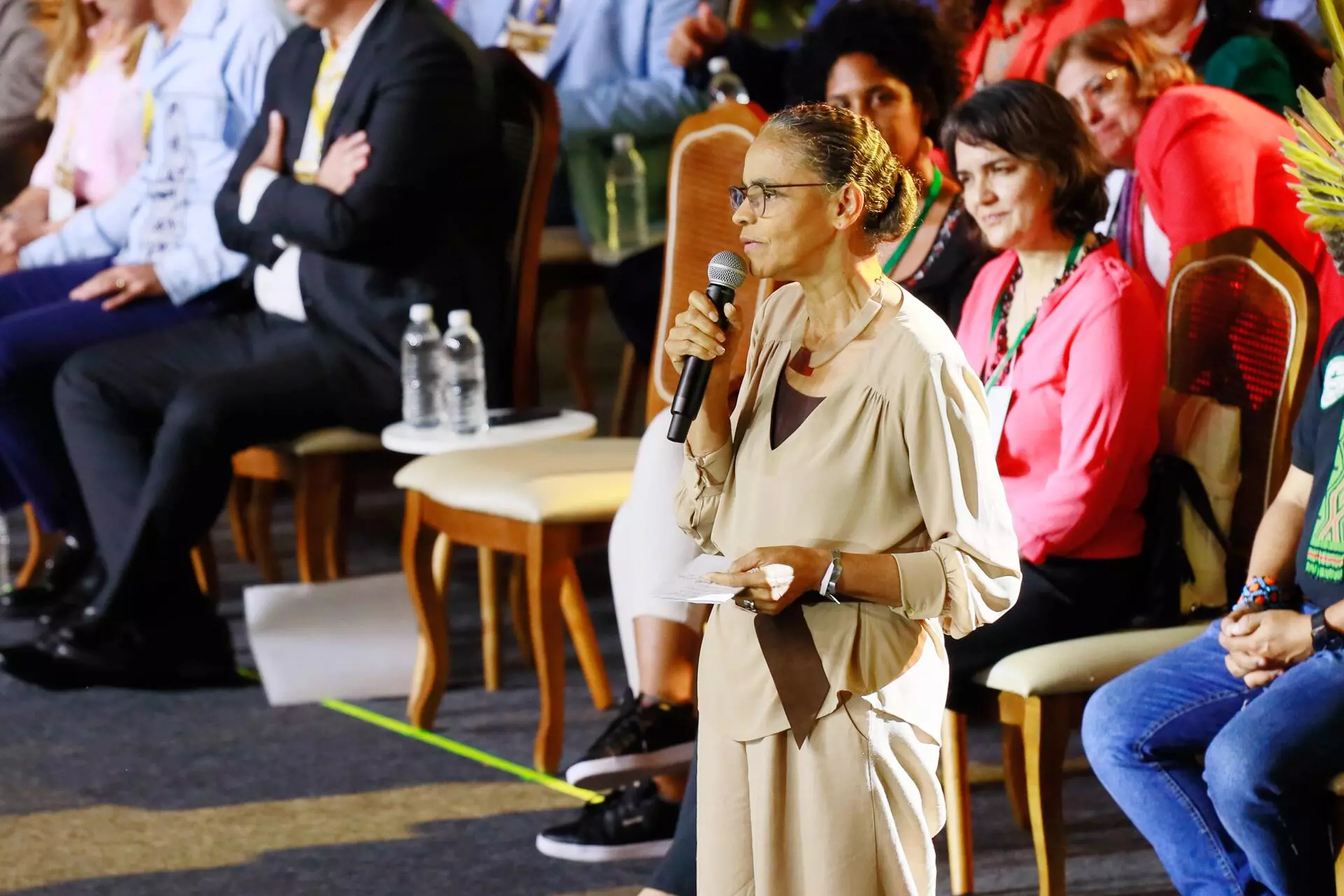
Environment Minister Marina Silva stressed the eight Amazonian nations’ commitment to preventing the forest from reaching the point of no return. Photo: Carlos Borges/SUMAÚMA
Following the summit, on August 9, Marina Silva gave an interview about the decisions made in Belém to the government’s media conglomerate, Empresa Brasil de Comunicação, which was broadcast on its Bom Dia, Ministra program. She was asked questions that recalled the existence of another Amazon, one that is unable to imagine itself without deforested land, extensive livestock farming, soy monoculture, and fossil fuels.
One radio reporter from Mato Grosso complained about the “restrictive Forest Code” and local farmers’ “image as environmental devastators” abroad, when “the large majority work legally.” Marina responded that it was necessary to work with the “principle of reality” and that the Amazon’s devastation is not “a matter of image,” since satellite monitoring shows where deforestation occurs.
Another radio reporter, from Amapá, complained about the state’s low level of industrialization and asked “what to tell the people of Amapá” about “the real chances” that the Environment and Climate Change Department would “at least authorize the research that will provide this certainty of whether or not we have oil here underground.” Marina repeated the environmental protection agency and her department “neither facilitate nor hinder” oil prospecting, that the analysis is technical, that Petrobras had resubmitted its license request to drill in the Foz do Amazonas basin, and that it will be analyzed “with every sense of responsibility.”
Father Dario Bossi recognizes that the change to a model that keeps the forest standing and guarantees communities’ rights means a “revolution that is cultural,” political, and economic. “The climate crisis, which is also an environmental, social and urban crisis, has been answered by maintaining the current model, which enjoys many benefits, but it is a remedy that worsens the crisis,” he said. “There is a short-term vision of finding resources. It’s not that people don’t see [what is happening]. [It’s that] they have immediate interests and prefer to keep going up to the limit.”
Along the Juruá River, where he has watched the seasons change for fifty-five years, Manoel Cunha has already found “the water is up to our noses and we can wait no longer.” He is witnessing an ecosystem out of balance, with atypical flooding and droughts. He says that in 2017, his brother lost seventy rubber trees, from which he tapped five kilos of rubber per day, a daily loss of R$ 237 (around US$ 45). “Climate changes are arriving in a perverse way for us, since we live in the environment and depend on rubber, on açaí, on agriculture, on managing fish,” says Manoel. “Either we transform how natural resources are used, losing this desperate greed for money, or we are left in a situation that perhaps even we are unable to survive.”
Spell check (Portuguese): Elvira Gago
Translation into Spanish: Meritxell Almarza
English translation: Sarah J. Johnson
Photography editing: Lela Beltrão
Page setup: Érica Saboya

Mulheres indígenas dançam e celebram durante a cerimônia de abertura dos Diálogos Amazônicos: objetivo central dos movimentos é frear a catástrofe ecológica e humana




